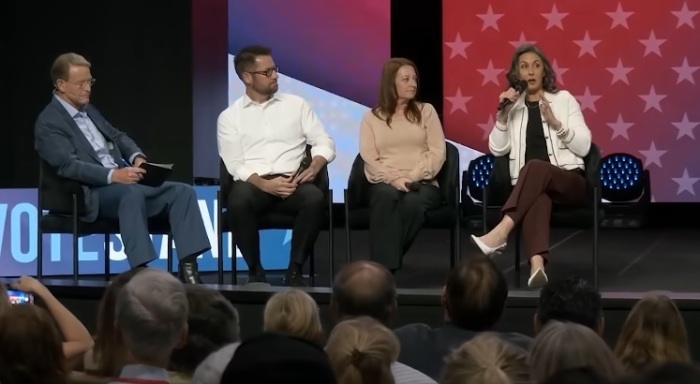Katie Faust, a prominent author and activist, says the church needs to “reclaim its mission of nurturing the next generation” from YouTube stars and other internet luminaries as more young people in the United States must be encouraged to attend church and participate in church culture.
Faust, who heads the organization Them Before Us and co-authored the book Them Before Us: Why We Need a Global Children’s Rights Movement, was one of several leaders who spoke at the Pray, Vote, Stand Summit hosted by the Christian conservative activist organization Family Research Council at Calvary Chapel Chino Hills, California, over the weekend. More than 1,500 people attended the summit.
Faust spoke on a panel about how Christians should engage with a culture that is hostile to Biblical values and teachings. FRC President Tony Perkins, a Baptist minister, moderated the panel discussion.
Faust described a “greater inclination toward traditionalism among boys” of Generation Z, the youngest group of American adults.
“They’re definitely flocking to church. For the first time since we started this study, I think there are more young boys who want to get married and have kids than young girls, which is crazy and amazing,” she said.

“We’ve seen this change in young men, and it’s not because pastors are speaking out about cultural issues and disciplining people. It’s because of YouTube,” she added. “There are some really great influencers like Jordan Peterson, Charlie Kirk, Ben Shapiro and Michael Knowles.”
Faust expressed his gratitude that “there are many good people who are telling the truth in a way that young people receive it,” which he said “has shaped and changed young people.” But she insisted young men “should hear that from their fathers and pastors.”
“Charlie Kirk didn’t know their names, Ben Shapiro didn’t know what was going on at the school,” Faust said.
“They need someone to process it with them in real life,” Faust argued. “And their pastor should be that person. And… if they have a father in their home, he really should be that person. They should be the source of truth. They should be the one who closely monitors their lives and their doctrine, so that it shapes not only their boys but their girls as well.”
Faust previously contrasted Gen Z men’s support for traditionalism with their female peers, saying they are less likely to want to get married and have children because they are “more susceptible to the social contagion of progressivism seen online and in schools.”
A Pew Research study released last year found that among childless young adults, men (57%) are more likely than women (45%) to want to become parents someday. According to data from Barna Group, nearly 4 in 10 young adult Gen Z women say they are atheist, agnostic, or have no religious faith at all. Other studies show that men (43%) are beginning to outpace women (36%) in weekly church attendance.
“It’s time for churches and families to reclaim their mission of raising the next generation, so we won’t outsource it to YouTube influencers,” Faust told the audience.
During a panel discussion, author and podcaster Natasha Crain reflected on the cultural hostility to Biblical values at the heart of the debate. She warned that some Christians refrain from engaging with this culture.
“I feel like a lot of the pressure to hide because of hostility comes from within the church,” she said.
“We’ve seen a lot of leaders within the church, a lot of pastors, do too much of this cottage industry of warnings that I was talking about, and it’s making us balk and make us think, ‘Oh, maybe we shouldn’t impose our values on other people,’ or ‘Maybe we shouldn’t ask for the power to do things.'”
Crane objected to those “certain matras” in the church.
“When you withdraw them, you find that they are actually logically inconsistent,” Crane says. “They are not consistent biblically. We are called to be salt and light. We are called to follow the commands of Jesus.”
“What is God’s command?” she asked. “Number one is to love God, and number two is to love others. It’s about loving your neighbor, right? So, if we love others, part of loving others, part of that work, but not all, is caring about their lives within the context of the society in which they live.”
Ryan Foley is a reporter for The Christian Post. Contact him at: ryan.foley@christianpost.com
